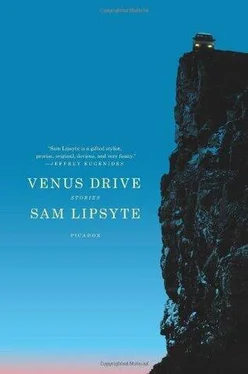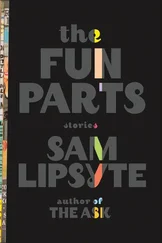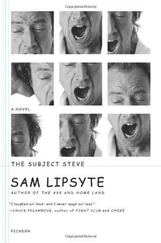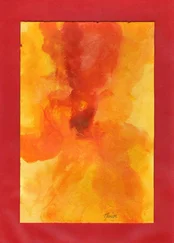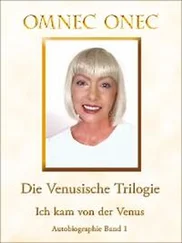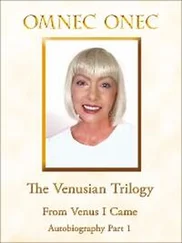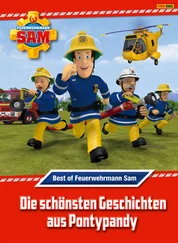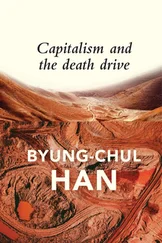“She’s okay, she’s going to be okay,” says Mrs. Lizzari. “She’s not so lucky yet.”
I nod, duck back inside.
My mother’s windows get no dawn light, but there’s a kind of slow undimming going on in the dining room.
I fetch the sack.
All it takes are the tiniest taps of the hammer to make a good part of my mother real old fashioned dust-to-dust-type dust. I crush a little morphine up and sift it in. I add some water, cook it all down in a spoon, draw it up through a hormone needle, roll my sleeve. I stanch the blood with velveteen.
Now I’m on the flower-print couch.
Now I’m thinking, is that the morphine, or is that my mother?
Something is setting beautiful fires up and down my spine.
Daddy can’t stand the kikes. Daddy says they look down their kike noses at him in the state store, where Daddy picks and packs, crates up the Liquor Board liquor. The kikes treat him without time of day.
“Those fucking kikes,” says Daddy.
Maybe Daddy’s a little tippy tonight.
“You’re tippy,” says Mother.
“I stopped for a few.”
“But Daddy,” I say, “aren’t we the kikes?”
“That’s what they say,” says Daddy. “I say it’s them. Who needs them? Who needs her?”
What Daddy maybe means is that us Cherskys of the Hill District are not like the Blitzsteins of Squirrel Hill, except maybe my Aunt Rachel, who married in, and who we never see her anymore.
“Who needs her?” says Daddy. “Let her cavort with the kikes.”
Cavort is a smartie word. It was on the vocab quiz. Maybe Daddy knows it because he used to be a smartie, too. Now he’s sore arms, sore neck from him hauling all the Liquor Board crates, sore everything every night, aching, waiting for his salt bath, wanting to know from us which of us needs Rachel. Now he shushes up for in case the Old Lady will hear. The Old Lady is in her room with her high holy silver, the Chersky locket swinging on her collar lace. She never leaves her room. She gets her dinner after, and not the ham we hide away. We are always shushing for in case the Old Lady puts her high holy ear to the keyhole. We never say the name of ham, or the name of Uncle Joey’s Polish girl, Paula, Paula, Paula.
Let them hide the ham away. Let Daddy come home tippy, or call Uncle Joey a bum until Joey bawls how it’s not his fault, it’s the gas he got in France, the mustard. Then he’ll peel off money for Daddy from his copper money clip. Mother says the money is green enough for legal tender, why ask what he does for it? A bagjob, a bet, a favor in a pinch? Bumhood is not Uncle Joey’s fault, either. He gave his mustard mask to a boy with bad breathing. The gas came floating through the trees of France, and now he reads books all day, Astronomy of the Gods, A Century of English Verse , spits dip on the back stoop, gets mustard nervous, waits for the moon to be over the park for Paula.
Let us just be Cherskys, Aunt Rachel’s Blitzstein shame. This is my belief.
Want to know my faith? School does. Mother says to say American.
“Hey,” says Uncle Joey, “how about Alleghenian? That’s what everyone around here is. Gypsy, dago, mick, it’s all Alleghenian.”
What about chink Chinese? I want to ask. What about my best girlfriend Mona Yee, who me and Mona are the front-desk smarties at Duquesne Grammar, tops, not counting Alvin Kwon? We are best friends with our shaved ices on the spit-brown stoop, and we are best friend rollers on our roller skates. Everyone who sees us sees us together, the Chersky girl, the pretty one, the only one, and Mona Yee, Chinese pretty. We are from up the Hill and we roll down it, past the bakery, the butcher shop, the state store where Daddy fetches whiskey for the kikes.
Sometimes I see Daddy through the window. He nods his curved-up jaw at Mr. Vance, the Liquor Board man. Maybe Daddy sees me but he never waves back. That’s okay, it’s like in school, somebody bombs you with an ink bomb on you, but even if the paper sticks to your blouse you better not turn, you better not look. Not if you want to stay a smartie. Only Alvin Kwon ever turns and only Alvin ever looks. He burns his eyes at the boys in back, the ones who vow they’re sending Alvin to the Slabs.
“Never!” says Alvin, who’s going to be mayor someday, and can recite the Gettysburg address in perfect Lincoln.
Today, Mona and me, we are after-class rollers, rolling under steel smoke, over all the broken sidewalk backs of mothers. We roll down the Hill past Paula’s house, to the city pool, where I swim in the no-pee water. Mona is sweet and waits with her books on the lawn. The no-pee pool is no-Chinese. Mona doesn’t mind. She’s getting smarter while I do my crawl, my butterfly, my aqua-ballerina spins. Oh, if only there were more of us Chersky girls, spinning out the letter C, all of us identical, aqua-amazing in our no-pee ballet. Only after, when I’m dressing, do I remember Mona out there under the steel-smoke-lifted dark, under Paula’s park moon. I come out with my hair knotty wet. We sit for another minute, then get ready to climb the Hill, skates laced around our necks. Mona’s having ham at the Chersky’s tonight.
Mother is mad at the Gypsies. What the Gypsies do is come to the back door, never the front door, ask to cut through. Who wants to tell a poor old Gypsy woman she can’t cut through? Don’t be a dummy, says Mother. Don’t be a dingbat, foolish. Sure, let them through, but don’t lead them. Otherwise, say good-bye to any silver on the table. Say good-bye to any nickels in a coin dish on the table.
“It’s not their fault,” says Uncle Joey. He’s got ham-hiding eyes. His fork has the French shakes.
“Whose fault is it then?” says Daddy.
“It’s their way,” says Mother. “We teach our children to read, they teach theirs to cut through.”
“My teacher taught me to read,” says Daddy.
“Are you tippy?” says Mother.
“I’m fine. I stopped for a few. Vance was making a Federal case again, what do you want? You know, I should just join the goddamn army. Be useful. Maybe I’m old, but I could do something. Supplies.”
“They’ll supply you with the mustard,” says Uncle Joey. “They’ll get you good.”
“Knock it off, Joseph,” says Daddy. “And for the month, what have you got?”
Uncle Joey peels new bills from his copper clip. Mother says we know the money is U.S. mint and that’s all we know. We don’t ask. We’re Cherskys, what’s to ask? We all look over to Mona, as though to say, “Oh, Mona, sorry for the family fuss.”
“Mona,” says Daddy, “how’s your ham?”
“Corned beef,” says Uncle Joey, keyhole loud.
Tonight we will be secret night rollers, me and Mona, after the sink, the towel, the rack. Daddy goes to his newspaper chair, with all the war parts and funny parts of the newspaper we are not to touch. Uncle Joey tunes in the radio scores, shines his shoes for Paula. The way he rocks in the rocker when the college scores come on, the vein in his forehead pumping like a Frenched-up heart, you’d think he went to college, but everything Uncle Joey knows, Mother told me, he read on the stoop, spit into the wind.
It must have been a good day for bleacher blankets, all the college smarties with their cocoa and their cheers. The radio man calls out numbers over brass and whistles, drums. Uncle Joey jumps. He looks afraid, like they’re going to supply him all over again, get him good, a gas bomb through the roof.
“Oh, shit, oh, shit,” he says, and goes.
“Don’t worry,” I tell Mona, “he’s just late to the park.”
Mona and me, we sneak out the back and roll down to Paula’s house, the alley window. Here’s moonlight Paula in a wintergreen slip. Here’s the bone-handled brush she pulls through her bone-colored hair. She brushes it and we wait for her to blow a kiss at Uncle Joey, who’s wallet-sized, tilted with the post-cards in the mirror. He has his brim hat on, his over-the-shoulder belt, his going-off-to-the-mustard-war shirt. We have the same picture in our house, and one of Uncle Ferdie, who didn’t get the mustard, who got a bullet in the neck instead.
Читать дальше
